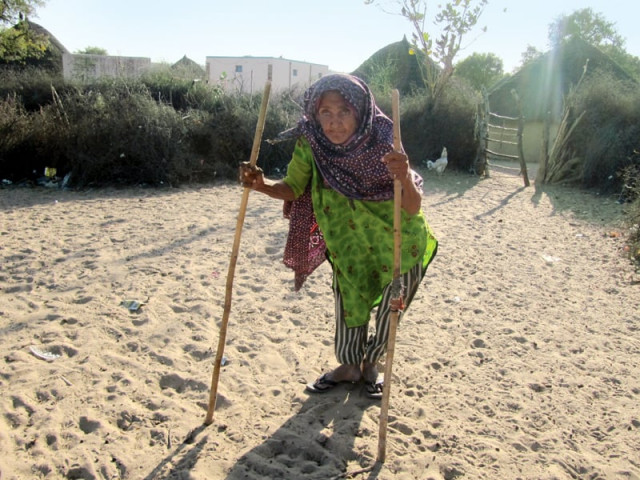Water woes: When heads cannot be held up high
In Tharparkar, an entire village walks with bent spines due to consumption of contaminated water.

Almost all of the 3,000-plus people in the village walk with their spines bent. PHOTO: AWARE
Nearby his mother, 53-year-old Hurmi, cannot walk at all, and is forced to crawl on the ground. This is not just the story of one house or one family. This is the story of each and every household in village Sammon Rind in tehsil Chachro, Tharparkar, about 480 km from Karachi. Almost all of the 3,000-plus people here walk with their spines bent, unable to stand up straight. The reason for their suffering is the very substance that sustains life itself: water. And in this village, every drop is tainted.
A timeline of Ramesh’s life is typical of almost all residents of this area. The highly contaminated water first affects the teeth, which start becoming deformed around the age of five to seven. Between 12 to 15 years of age, bone deformities start setting in. Coupled with the harsh and hot desert climate and chronic malnutrition, even adolescents start acquiring a shriveled appearance, mimicking old age. By the time they are 25-year-old or above, almost all of them walk with their spines bent. Water, the source of life, has ended up crippling not just their bodies but their dignity and their chance at a normal life. And no one seems to care.
Former Secretary General of the United Nations Kofi Annan once said that contaminated water jeopardises both the physical and social health of people, and is therefore “an affront to human dignity”. The reality of this remote part of Pakistan is that no head is held up high, literally.
Almost poison
Seeing the standards the World Health Organisation (WHO) has set for water safe for human consumption, one is forced to wonder how people in villages like Samoon Rind and Mau Akheraj in parched Tharparkar are still alive. But a look at their lives makes one wonder if this can be called life at all.
High fluoride content is mostly the culprit. According to the WHO, fluoride levels above 1.5 mg/l cause Fluorosis resulting in the pitting of tooth enamel and deposits in bones. Above about 10 mg/l causes crippling skeletal Fluorosis. In Tharparkar, fluoride content is found to be up to 31 mg/l.
Many of these victims suffer from diseases of “jaws, bones, teeth, liver, kidneys - contaminated water can affect all organs and these effects can be irreversible,” says orthopaedic surgeon Dr Tayeb Asim.
The arsenic contamination of underground water in Thar has been confirmed by United Nations International Children’s Education Fund (UNICEF) and chronic arsenic poisoning is considered to be a serious health emergency.
The WHO consumption limit for Total Dissolved Salts (TDS) is 1500 mg/l. But more than 50% of the population in Tharparkar is getting water that has TDS of more than 5,000 mg/l. In village Narowari, the water’s TDS content can go as high as 20,000.
A worthless struggle?
“The people of this area have been struggling to draw attention to these problems but all we get is promises. Governments come and go but no one does anything to help us,” says Ali Akbar, Executive Director, Association for Water Applied Education & Renewable Energy (AWARE), who has been working closely with effected communities.
He mentions the likes of Nisar Khuhro and Sharmila Faruqi giving commitments that never materialised. In January, locals went on a hunger strike in Mithi when they heard that President Asif Ali Zardari was expected to visit, but he never came.
Talking solutions
The preferred option is to find an alternative water source with lower Fluoride levels, as it is difficult and expensive to reduce a high natural level of fluoride in water. If there is no other possible or cost-effective source, de-fluoridation must be attempted to avoid the toxic effects. Digging deeper wells, rainwater harvesting, and installation of de-fluoridation and desalination plants is what should be done urgently.
A parched life in Tharparkar
• Tharparkar is ranked by the World Food Programme as the most food insecure of Pakistan’s 120 districts.
• 89% of underground water in Thar is not fit for human consumption.
• On an average, 3 people from each household spend 3-5 hours daily to fetch water for human consumption and watering the animals.
• Women and children have to pull the rope by hands.
• High maternal mortality rates in Tharparkar are related to lifting heavy water-carriers for hours and miles. Pregnant women suffer the most
• The bones of these women are not well- formed, which is why they often cannot sustain child-bearing and die
• No one wants to marry girls and boys of this village after ages 12-15 as because of brackish water, they acquire the appearance of old age. The result is high incidences of child marriage
• Drought causes fodder shortage and animals get weaker, which is why livestock keepers migrate to barrage areas
• High incidences of migration disrupt normalcy of life, which is why dropout rate of school-children is high
• Due to difficulties of collecting water, people use it sparingly, which results in unhygienic conditions leading to diseases
• The men suffer more as they do more physical work, hence they feel more thirsty and consume more water which is highly contaminated, and develop debilitating diseases
Published in The Express Tribune, May 19th, 2013.



















COMMENTS
Comments are moderated and generally will be posted if they are on-topic and not abusive.
For more information, please see our Comments FAQ